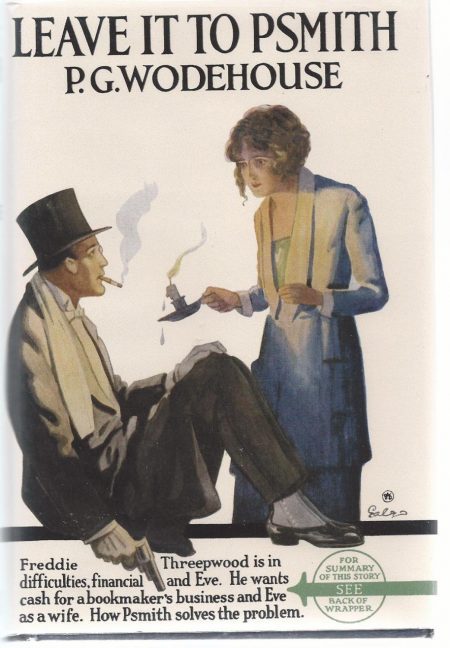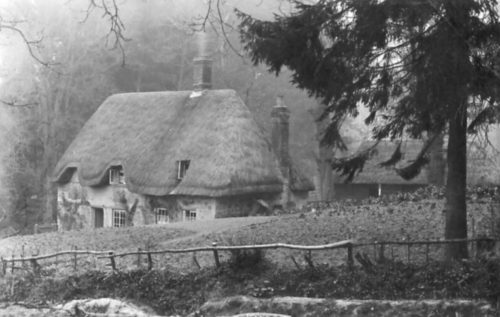LEAVE IT TO PSMITH (48)
By:
December 14, 2019

Leave It to Psmith (1923) is the last and most rewarding of four novels featuring the dandy, wit, and would-be adventurer Ronald Eustace Psmith, one of P.G. Wodehouse‘s most popular characters. (“One can date exactly,” Evelyn Waugh claimed, in reference to Psmith’s debut in the 1909 novel Mike, “the first moment when Wodehouse was touched by the sacred flame.”) Leave It to Psmith‘s copyright enters the public domain in 2019; HiLoBooks is pleased to serialize this terrific book here at HILOBROW. Enjoy!

The tiny sitting room of Psmith’s haven of rest in the woods had never reached a high standard of decorativeness even in its best days; but as Eve paused from her labors and looked at it in the light of her lamp about an hour after her conversation with Freddie on the terrace it presented a picture of desolation that would have startled the plain-living gamekeeper to whom it had once been a home. Even Freddie, though normally an unobservant youth, seemed awed by the ruin he had helped to create.
“Golly!” he observed. “I say, we’ve rather mucked the place up a bit!”
It was no overstatement. Eve had come to the cottage to search, and she had searched thoroughly. The torn carpet lay in an untidy heap against the wall. The table was overturned. Boards had been wrenched from the floor, bricks from the chimney place. The horsehair sofa was in ribbons and the one small cushion in the room lay limply in a corner, its stuffing distributed north, south, east and west. There was soot everywhere — on the walls, on the floor, on the fireplace and on Freddie. A brace of dead bats, the further result of the latter’s groping in a chimney which had not been swept for seven months, reposed in the fender. The sitting room had never been luxurious; it was now not even cozy.
Eve did not reply. She was struggling with what she was fair-minded enough to see was an entirely unjust fever of irritation, with her courteous and obliging assistant as its object. It was wrong, she knew, to feel like this. That she should be furious at her failure to find the jewels was excusable, but she had no possible right to be furious with Freddie. It was not his fault that soot had poured from the chimney in lieu of diamonds. If he had asked for a necklace and been given a dead bat, he was surely more to be pitied than censured. Yet Eve, eying his grimy face, would have given very much to have been able to scream loudly and throw something at him. The fact is the Honorable Freddie belonged to that unfortunate type of humanity which automatically gets blamed for everything in moments of stress.
“Well, the bally thing isn’t here,” said Freddie.
He spoke thickly, as a man will whose mouth is covered with soot.
“I know it isn’t,” said Eve. “But this isn’t the only room in the house.”
“Think he might have hidden the stuff upstairs?”
“Or downstairs.”
Freddie shook his head, dislodging a portion of a third bat.
“Must be upstairs, if it’s anywhere. Mean to say, there isn’t any downstairs.”
“There’s the cellar,” said Eve. “Take your lamp and go and have a look.”
For the first time in the proceedings a spirit of disaffection seemed to manifest itself in the bosom of her assistant. Up till this moment Freddie had taken his orders placidly and executed them with promptness and civility. Even when the first shower of soot had driven him choking from the fireplace his manly spirit had not been crushed; he had merely uttered a startled “Oh, I say!” and returned gallantly to the attack. But now he obviously hesitated.
“Go on,” said Eve impatiently.
“Yes, but, I say, you know ——”
“What’s the matter?”
“I don’t think the chap would be likely to hide a necklace in the cellar. I vote we give it a miss and try upstairs.”
“Don’t be silly, Freddie. He may have hidden it anywhere.”
“Well, to be absolutely honest, I’d much rather not go into any bally cellar, if it’s all the same to you.”
“Why ever not?”
“Beetles. Always had a horror of beetles. Ever since I was a kid.”
Eve bit her lip. She was feeling, as Miss Peavey had so often felt when associated in some delicate undertaking with Edward Cootes, that exasperating sense of man’s inadequacy which comes to high-spirited girls at moments such as these. To achieve the end for which she had started out that night she would have waded waist high through a sea of beetles. But, divining with that sixth sense which tells women when the male has been pushed just so far and can be pushed no farther that Freddie, wax though he might be in her hands in any other circumstances, was on this one point adamant, she made no further effort to bend him to her will.
“All right,” she said. “I’ll go down into the cellar. You go and look upstairs.”
“No, I say, sure you don’t mind?”
Eve took up her lamp and left the craven.
For a girl of iron resolution and unswerving purpose, Eve’s inspection of the cellar was decidedly cursory. A distinct feeling of relief came over her as she stood at the top of the steps and saw by the light of the lamp how small and bare it was. For, impervious as she might be to the intimidation of beetles, her armor still contained a chink. She was terribly afraid of rats. And even when the rays of the lamp disclosed no scuttling horrors, she still lingered for a moment before descending. You never knew with rats. They pretended not to be there just to lure you on, and then came out and whizzed about your ankles. However, the memory of her scorn for Freddie’s pusillanimity forced her on, and she went down.
The word “cellar” is an elastic one. It can be applied equally to the acres of bottle-fringed vaults which lie beneath a great pile like Blandings Castle and to a hole in the ground like the one in which she now found herself. This cellar was easily searched. She stamped on its stone flags with an ear strained to detect any note of hollowness, but none came. She moved the lamp so that it shone into every corner, but there was not even a crack in which a diamond necklace could have been concealed. Satisfied that the place contained nothing but a little coal dust and a smell of damp decay, Eve passed thankfully out.
The law of elimination was doing its remorseless work. It had ruled out the cellar, the kitchen and the living room — that is to say, the whole of the lower of the two floors which made up the cottage. There now remained only the rooms upstairs. There were probably not more than two, and Freddie must already have searched one of these. The quest seemed to be nearing its end. As Eve made for the narrow staircase that led to the second floor the lamp shook in her hand and cast weird shadows. Now that success was in sight, the strain was beginning to affect her nerves.
It was to nerves that in the first instant of hearing it she attributed what sounded like a soft cough in the sitting room, a few feet from where she stood. Then a chill feeling of dismay gripped her. It could only, she thought, be Freddie, returned from his search; and if Freddie had returned from his search already, what could it mean except that those upstairs rooms, on which she had counted so confidently, had proved as empty as the others? Freddie was not one of your restrained, unemotional men. If he had found the necklace he would have been downstairs in two bounds, shouting. His silence was ominous. She opened the door and went quickly in.
“Freddie ——” she began, and broke off with a gasp.
It was not Freddie who had coughed. It was Psmith. He was seated on the remains of the horsehair sofa, toying with an automatic pistol and gravely surveying through his monocle the ruins of a home.
SERIALIZED BY HILOBOOKS: Jack London’s The Scarlet Plague | Rudyard Kipling’s With the Night Mail (and “As Easy as A.B.C.”) | Arthur Conan Doyle’s The Poison Belt | H. Rider Haggard’s When the World Shook | Edward Shanks’ The People of the Ruins | William Hope Hodgson’s The Night Land | J.D. Beresford’s Goslings | E.V. Odle’s The Clockwork Man | Cicely Hamilton’s Theodore Savage | Muriel Jaeger’s The Man With Six Senses | Jack London’s “The Red One” | Philip Francis Nowlan’s Armageddon 2419 A.D. | Homer Eon Flint’s The Devolutionist | W.E.B. DuBois’s “The Comet” | Edgar Rice Burroughs’s The Moon Men | Charlotte Perkins Gilman’s Herland | Sax Rohmer’s “The Zayat Kiss” | Eimar O’Duffy’s King Goshawk and the Birds | Frances Hodgson Burnett’s The Lost Prince | Morley Roberts’s The Fugitives | Helen MacInnes’s The Unconquerable | Geoffrey Household’s Watcher in the Shadows | William Haggard’s The High Wire | Hammond Innes’s Air Bridge | James Branch Cabell’s Jurgen | John Buchan’s “No Man’s Land” | John Russell’s “The Fourth Man” | E.M. Forster’s “The Machine Stops” | John Buchan’s Huntingtower | Arthur Conan Doyle’s When the World Screamed | Victor Bridges’ A Rogue By Compulsion | Jack London’s The Iron Heel | H. De Vere Stacpoole’s The Man Who Lost Himself | P.G. Wodehouse’s Leave It to Psmith | Richard Connell’s “The Most Dangerous Game” | Houdini and Lovecraft’s “Imprisoned with the Pharaohs” | Arthur Conan Doyle’s “The Sussex Vampire.”
RADIUM AGE SCIENCE FICTION: “Radium Age” is HILOBROW’s name for the 1904–33 era, which saw the discovery of radioactivity, the revelation that matter itself is constantly in movement — a fitting metaphor for the first decades of the 20th century, during which old scientific, religious, political, and social certainties were shattered. This era also saw the publication of genre-shattering writing by Edgar Rice Burroughs, Sax Rohmer, E.E. “Doc” Smith, Jack London, Arthur Conan Doyle, Aldous Huxley, Olaf Stapledon, Karel Čapek, H.P. Lovecraft, Charlotte Perkins Gilman, Yevgeny Zamyatin, Philip Gordon Wylie, and other pioneers of post-Verne/Wells, pre-Golden Age “science fiction.” More info here.
READ GORGEOUS PAPERBACKS: HiLoBooks has reissued the following 10 obscure but amazing Radium Age science fiction novels in beautiful print editions: Jack London’s The Scarlet Plague, Rudyard Kipling’s With the Night Mail (and “As Easy as A.B.C.”), Arthur Conan Doyle’s The Poison Belt, H. Rider Haggard’s When the World Shook, Edward Shanks’ The People of the Ruins, William Hope Hodgson’s The Night Land, J.D. Beresford’s Goslings, E.V. Odle’s The Clockwork Man, Cicely Hamilton’s Theodore Savage, and Muriel Jaeger’s The Man with Six Senses. For more information, visit the HiLoBooks homepage.
